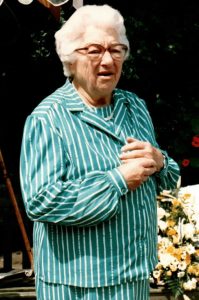Freda Gwilliam – An inspiration for our times
Local resident, radio presenter, event organiser, volunteer and more Micky Gwilliam, has just sent us the obituary of his aunt Freda Gwilliam (centre in the picture above, holding a handbag), for reasons that will become clear as you read it. She sounds a truly inspiring women. The last week and weekend have again highlighted the inequalities that women continue to face in our society. If she were alive today I can see Freda on Clapham Common bandstand leading from the front.
The obituary is taken from the Notting Hill and Ealing High School Old Girls’ Association Newsletter, 1988.
“Miss Freda Gwilliam C.B.E., M.A., D.Litt, who died on 14th August 1987 at the age of 80, had a distinguished career as Woman Education Adviser to the Colonial Office and subsequently, the Department of Technical Cooperation and the Ministry of Overseas Development, retiring in 1970 as Deputy Chief Education Adviser to the Minister.
Born in 1907, Freda Howitt Gwilliam was educated at Notting Hill High School and Girton College, Cambridge, where she read History. After teaching in secondary schools for some years, she became a Lecturer at Bishop Otter Training College, Chichester and then Principal of Brighton Training College during World War II. However, she found her true vocation when in 1947 she joined the Colonial Office.
Although Freda Gwilliam’s official work covered the whole field of education in the developing countries of the world, her greatest contribution was made to the education of women and girls. During the 1950s and 60s, she ensured the establishment of girls’ schools and colleges throughout the colonies; she recruited scores of remarkable British women to teach in them or to administer them and she kept in personal touch with them all. She enabled hundreds of indigenous women teachers from those countries to study in the United Kingdom and knew most of them by name. She represented Her Majesty’s Government with distinction at numerous international conferences and served on many a mission, notably the Binns Mission of 1952 concerning education in eastern Africa. Above all, personally and with panache, she supervised the whole operation not so much from Whitehall but by spending time overseas.
Indeed, Freda Gwilliam was an inveterate and indefatigable traveller. Appointed to the Colonial Office in May 1947, before the end of June she had embarked on a ship for Capetown and, having visited Basutoland, Swaziland, Bechuanaland, Southern and Northern Rhodesia, Nyasaland and Kenya, she reappeared in Whitehall just before Christmas. Again, in October 1950, she embarked for the USA and returned to the United Kingdom in April 1951, having visited all the British colonies in the Pacific and South East Asia as well as Australia and Ceylon. Later the general use of the aeroplane reduced the length of Freda Gwilliam’s tours but she continued to visit countries with a thoroughness few of her successors have been able to match. Such were her official duties. It is impossible to mention all her voluntary ones.
In earlier times Freda Gwilliam worked at the Katherine Low Settlement in Battersea, was a Training Officer for the Red Cross, and served as Area Commandant of the Girls’ Training Corps; she was a member of the House of Laity of the Church Assembly; she was a Justice of the Peace. More recently she was a member of the Council of Voluntary Service Overseas from 1961 to 1980 and the distinguished chairman of its Executive Committee from 1970 to 1977. She was a keen member and Life Vice-President of the Women’s Corona Society, a major role of which is to help the expatriate women and schoolchildren who these days live in developing countries. She was a busy member of the Women’s Institute, the Association of Countrywomen of the World and Men of the Trees. Locally, she was chairman of Frant Parish Council, most active for the Sussex Rural Schools Project and for the Army Benevolent Fund. The list is endless.
Freda Gwilliam’s life was one of duty and service, both official and voluntary, but service undertaken with warmth and in impressive style. She devoted her life to the cause of women and girls throughout the Commonwealth and of the expatriate women who lived and worked out there, encouraging the young to take over from her generation. She belonged to that nearly extinct breed of tough and tireless ladies who fostered the education of girls across the globe. When she entered the colonial service, the education of girls was rare indeed; by the time she retired it was the accepted thing. No “feminist”, she helped many thousands of females in the developing countries. No “do-gooder”, she did untold good.”

Freda, celebrating her 80th birthday and a week before she died.